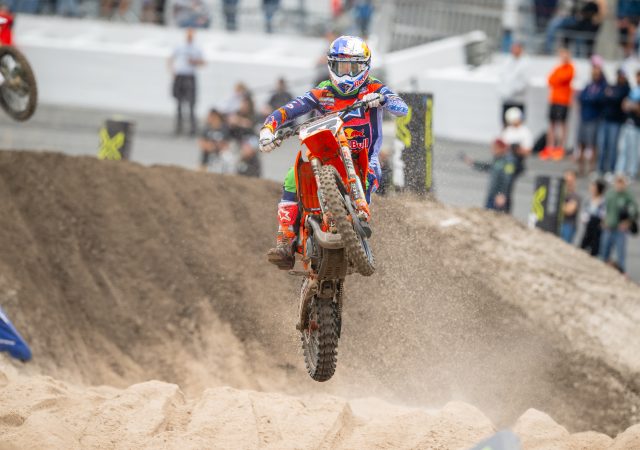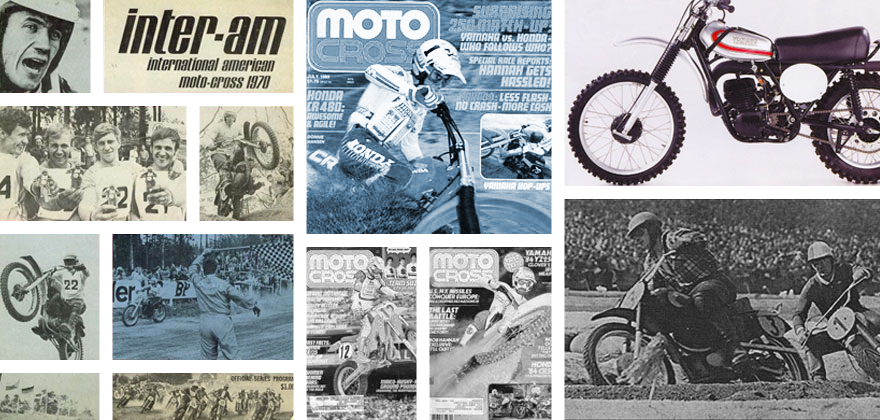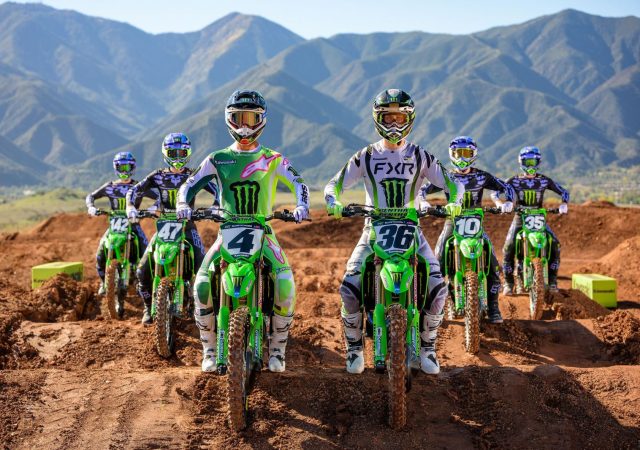Paul Quesnel’s latest column gives us a reminder that every so often, anarchy rules.
Paul Quesnel’s latest column gives us a reminder that every so often, anarchy rules.
By Paul Quesnel
Lead in Photo by Paul Buckley
As the dictionary reads, the word anarchy is best described as, “a state of disorder due to an absence of authority.” When you translate this into terms pertaining specifically to supercross, the definition I came up with is, “a time when everyone thinks they can win because no one has yet to establish dominance in the class.” This lack of hierarchy within the field is what the fans, promoters, journalists, and just about everyone else, hope to see every season when Anaheim rolls around. Before a new year begins, we all pray that the upcoming series will not be dictated by a single rider, and that the winner of each race will not be a foregone conclusion. Sadly though, if you take a quick glimpse at the history of supercross, you will see that these periods of, “anarchy”, as I like to call them, don’t appear very often and when they do they are usually relatively short lived. Nonetheless, sprinkled in between the great champions of our sport and their multi-year title reigns, we have witnessed varying degrees of anarchy throughout the decades. These intervals of time would prove to hold some of the greatest racing action our sport has ever seen.
So let’s start at the beginning, which just happens to be one of the most anarchic times in the history of the class. The reason for this, which is a bit obvious, is because the supercross series was so new at the time that all the riders hadn’t yet adapted their training to adhere to the style of racing taking place in SX. In turn, no one could really gain the upper hand on anyone else because they were all figuring it out at the same rate. Add in the fact that the seasons were so short (three races) and it becomes easy to understand the lack of domination from a single rider.
In the early years of ’74,’75 and ‘76, the blossoming series saw men like Karsmakers, Ellis, Smith, DiStefano, Weinert, and Pomeroy trade race wins between one another while each tried to gain their own type of stranglehold on the sport. During these first three seasons, Karsmakers, Ellis, and Weinert would trade the championship amongst themselves, yet none of them would be able to establish a type of supremacy that lasted over a single year. Nevertheless, there was a storm brewing on the horizon (more specifically, a “Hurricane”) and as a result, this fluctuation in momentum would not last very much longer. In ’77, the sport would be introduced to its first true dictator when Bob “The Hurricane” Hannah burst onto the scene in dramatic fashion. In addition to winning the supercross championship three years in a row (‘77, ’78, and ’79) Hannah also managed to win the most races in each of those seasons, making him the man to beat in the ever-growing SX series. By the time the end of the ‘70s came around, the Hurricane, with his go for broke/win at all cost attitude, had won the hearts of the public and firmly established himself as the original American supercross legend.
From there, as the late ‘70s soon led way into the early ‘80s, the supercross championship would see a great influx of talented riders. This inrush of gifted athletes would include men such as Barnett, Glover, Shultz, Bailey, Leichen and O’Mara, among others. With the depth in the class rising at an extreme rate, the five seasons between ’80 and ’84 would prove to be the most anarchic time in the history of SX. During this span of time, there would be no chain-of-command within the field of riders, no single man ruling the class with an iron fist. After Bob Hannah relinquished the title in the late ‘70s, the crown would pass from man to man in the early 80’s, never repeating which rider it went to. Bell would take championship in ’80, Barnett in ’81, Hansen in ’82, Bailey in ‘83, and O’Mara in ’84. Of said men, these would be the only supercross titles they would ever win. As a fan of the sport and as an enthusiast of great racing, if I could choose a period of time and magically travel back into the past to witness it, I would choose this five year span. There were multiple race winners, an ample amount of action, and at least five men who had a legitimate chance at winning every time they lined up at the gate. It was pure anarchy.
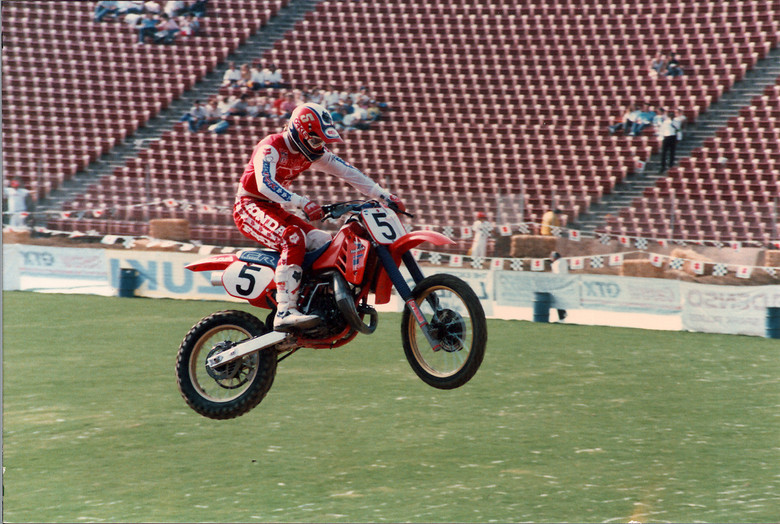 |
|
Rick Johnson was the man in the mid-80’s and when he was done, he was the all-time winner in supercross. Photo by Randy Rogers |
Alas, good things must always come to an end and towards the mid ‘80s, things were beginning to change. The first part of the decade had been an absolute free-for-all, and by ’85 the class was wide-open, just waiting for someone to step in and take control. However, instead of having just one man stepping up and taking authority, this time the series was about to witness two tyrant’s battle it out in a four-year war over supercross supremacy. Around the time the ’84 season entered its full stride, Jeff Ward and Ricky Johnson would begin tightening a noose around the neck of the class, a noose that would stay there for close to the rest of the decade. Ward would strike first by winning his first SX title in ’85, and this would be quickly followed up by Johnson nabbing his first at the end of ’86. In ’87, Ward would become only the second rider in the history of the class to win more than one supercross championship, but in an effort to not be outdone by his rival, Johnson would become the third man score two SX titles in ’88. Yet while these two were chasing records and mostly concentrating on each other, there were still other men such as Bailey, O’Mara, Lechien, and Glover that had the ability to win races. Regardless of that though, championships don’t lie, and I don’t think anyone can deny that the late ‘80s belonged mostly to these two men. Due to injuries and their increasing age, the fierce duel between these two monarchs would fizzle out by ’89, but not before they solidified their status as supercross heroes. For almost half the decade, the two kings had fought tooth-and-nail to prove their dominance in the series. This period of time couldn’t be classified as absolute anarchy, but at the same time it wasn’t complete totalitarian rule either. It was somewhere in the middle, and it actually pretty damn good racing.
In ’89, the supercross series was about to witness an unexpected turn of events, and the two horse race between Ward and Johnson was about to quickly become a one man show. When the season began, Rick Johnson was on an absolute mission, winning the first five races of the year in an effort to gain his third SX title. Unfortunately, Johnson would get injured at the first outdoor national of the season and after that, he would never quite be the same. With Ward also dealing with an injury that stemmed from early that year, the class now had no dominant figures, and for a brief moment it looked as if anarchy was about to ensue. Except, it didn’t. When his teammate became injured, Jeff Stanton, factory Honda’s new recruit, was quickly forced into the role of lead rider for the highly regarded Honda squad. How he would respond to this newfound pressure would take everyone completely by surprise. Picking up exactly where his teammate had left off, Stanton would collect his first ever SX win at round six of the series then follow that up with two more consecutive wins. He would gain two more victories that season before wrapping up his first supercross championship, but not before other riders like Ward and Lechien had time to sneak in a few wins. At the end of ’89, Jeff Stanton was a dictator in the making, but at the same time he didn’t have that raw, flat-out speed that many other great supercross champions possess. While he was, by all accounts, outrageously fast, his true gift was his unmatched fitness and the fact that he was just such a solid rider. While continuing his title reign into the new decade, Stanton, with his ultra-consistent results and even-tempered manner, would continue to lay the foundation for the future Ryan Dungey’s of the class.
Stanton would go on to win two more supercross titles in ’90 and ’92, but neither of them would come easy for him. With new challengers in the class like Bradshaw, Bayle, Matiasevich, and Kiedrowski, things were only getting tougher for the Michigan native as the years went on. In ’91, Stanton’s Honda teammate, Jean-Michel Bayle, would beat him for the SX championship by a pretty large margin and in ’92, in what was one of the greatest seasons ever (in my opinion), Stanton would just barely edge a surging Damon Bradshaw for his third and final supercross title. It was clear that Stanton was not the most dominant force the series had ever seen, but like I said before, championships don’t lie. By winning the crown three out of four years (and becoming only the second rider to win three titles), Jeff had substantially secured his name in the records books as one of the great rulers of the sport. But even though he essentially had control over the class during his four-year conquest, there was a bit of anarchy and some straight up great racing. He was a different kind of tyrant, one that would let the others riders get a few wins here and there, knowing that in the end his consistency would usually prevail.
Following Stanton’s lenient four-year reign of supremacy, the sport would be introduced to the most superior and influential figure it would ever see. Jeremy McGrath, the factory Honda rookie, would explode into the premier class in ’93 by winning a total of ten races and becoming the first person in history to win the championship in his freshman year. From that point forward, the series would never quite be the same. McGrath, with his revolutionary style on the bike, would simply overpower the class for the rest of the decade and crush nearly every supercross record along the way. His stranglehold on the sport, which began in his maiden season of ’93, would stretch all the way into the new century and last a total of eight seasons. Of said seasons, he would gain seven SX championships, 70 career wins, and for the most part, completely decimate the competition. The only hiccup he would run into was in ’97 when, after switching to an unfamiliar Suzuki, he would narrowly lose the SX title to Kawasaki’s Jeff Emig. McGrath was by far the most domineering ruler the sport had ever seen and, “The King,” moniker that was given to him was a perfect fit because he was great at suppressing anarchy. When he was at his peak, the best thing you could hope for as a fan was that he would get a flat tire so hopefully there would be a race for the lead. After what would be his final championship in ’00, McGrath would come into ’01 facing the toughest challenger he would ever run into. But while this competitive opponent would be welcomed by the sport with open arms, little did anyone know that we were about to simply trade one King for another.
With a decent amount of success in the lites ranks already, Ricky Carmichael, the promising Kawasaki protégé, would prematurely jump into the premier SX class at the beginning of the ’99 season. But while he was by all means blazingly fast, he was very inconsistent and had a tendency to crash a lot. It would end up taking the Floridian an entire two years in the series before he would be ready to attempt to dethrone McGrath and by this time, the fans just wanted to see someone else win. As the ’01 season got underway, it looked as if we were finally going to see a decent title fight as McGrath and RC traded wins in the early rounds. For a time it seemed as if the King had finally met a worthy opponent, but soon we would all learn that Carmichael was much more than that. After gaining his second win of the year at round four, Ricky would go on an absolute tear by winning the remaining twelve races and collecting his first SX championship. He had officially stolen the crown away from the King and the sport was again in the hands of ruthless monarch.
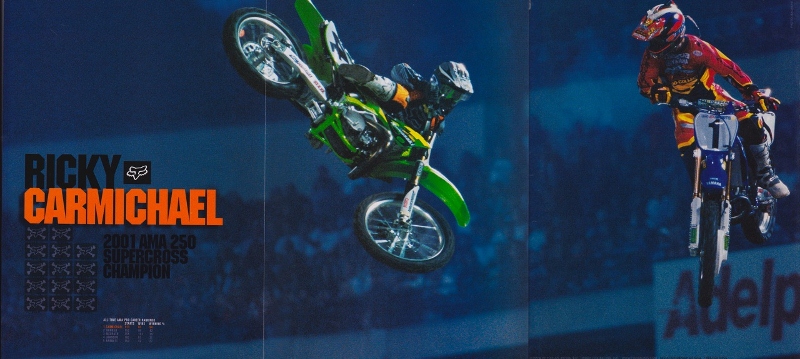 |
|
These two rivals passed each other in time at one point early this century. |
Carmichael’s command of the series would end up lasting from the beginning of ’01 until the end of ’06, where he promptly announced that he would be retiring the following season. Like McGrath, his championship span would have a one year gap right in the middle of it because of an injury in ’04. In the end, he would collect a total a five championships and 48 career wins, staggering numbers indeed but not enough to beat the Kings records. Although he would receive a good amount of competition from riders like Chad Reed, David Vuillemin, Kevin Windam, and eventually James Stewart, he would never be straight up beaten for a title after his first in ’01. Like I said already, championships don’t lie and I think everyone will agree that RC was the last dominant ruler the sport has seen. At the same time though, other riders were able to beat him on a decently regular occasion. And while it was in no way anarchy, there was still some races where you weren’t sure who was going to win. At first, everyone loved when Carmichael came in and started beating McGrath, but after a while the sentiment towards him shifted and again the fans just wanted to see someone else win. Chad Reed would be able to fill this satisfaction some of the time, but when it came putting an end to RC’s reign of terror, the task was put on the hottest amateur prospect to ever hit the sport.
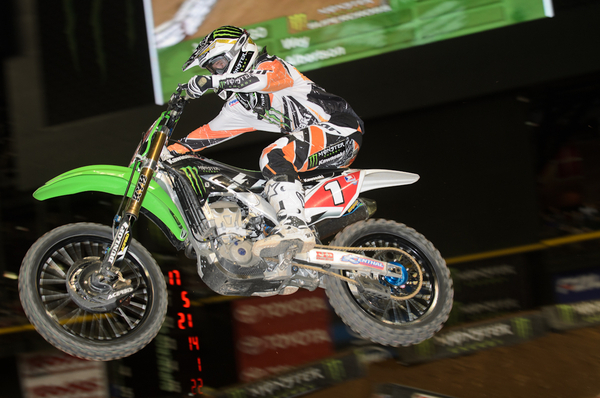 |
|
Right now the supercross king is Ryan Villopoto. Photo by James Lissimore |
After much hype and speculation, James Stewart would finally make his way into the big bike class at the beginning of ’05. While he was no doubt the fastest man on the track most of the time, he was always a bit inconsistent. Originally, everyone thought that he was going to be the rider to take the crown away from the great Carmichael but unfortunately for James, it would never happen. After missing most of his rookie season with an injury, Bubba with battle with RC and Reed for the ’06 crown and end up losing it by the smallest of margins. With Ricky now retired in ‘07, he would beat out the now veteran, Chad Reed, to win his first SX championship in the class. While it took longer than many people expected, Stewart was now at the top steps of the sport and most thought he was going to stay there for a while. Yet in another stroke of bad luck, Stewart would have to miss the majority of the ’08 season due to injury and the title would go to Reed, the now two time champion. When James made his return in ’09 fully healthy, again people thought that he was just going to breeze through the competition. After some surprisingly good racing action from he and Reed, Bubba would eventually capture his second SX title by the end of the season, but the Australian had served noticed that he wasn’t going to take these beatings lying down. Coming into ’10, speculation was that this was going to be the year that James put a stamp on the fact the he was the new dictator in the class. Frustrating to everyone though, the injury bug would strike again and before the series hit the fourth round, both Stewart and Reed would be on the side lines. From this point on it was a two horse race between Dungey and Villopoto for the title, but in the back of everyone’s mind they knew that whoever won it would have to have it validated once Reed and Stewart were back. This brings us to the ’11 season, one of the most anarchic we have seen in a very long time. While Dungey was the champion coming into the year, many people still looked at Stewart as the commander of the class. The result was on all out battle between all parties involved. There was no chain of command, no pecking order to be heard of, and no dominant figure. The top five believed that they could win and that’s exactly what they did.
Presently, we could be in the midst of a champion being made into a King. By becoming the first person since RC to win two titles in a row, Ryan Villopoto is now in a position to become the next tyrant of our sport. Although James Stewart was supposed to take on this exact role after Carmichael retired, his championships have been too few and far between to put him on the same level as Hannah, Stanton, McGrath, and RC. At one time there is no doubt that Bubba was the fastest man to throw a leg over a dirt bike, but due to constant injuries and other complications, he might be too late to gain the record breaking success he strived for in the beginning of his career. Instead of completely taking over when RC retired, the class has been mostly chaotic since the GOAT left. With no one able to put together a successful string of championships since Ricky, the role of dictator became vacant in ’11, one of the most wide-open seasons we’ve ever seen, and RV has since established himself in that role. Now there is no way that Villopoto is the complete ruler just yet, but he very well could be on his way. For those of you that disagree to this due to the fact that all the major players went out with injuries this year, recognize that at the last round the big four were still in the series(round 6), Villopoto had won half of the races up to that point. Where we go from this point forward is anyone’s guess. Will RV go on a title streak to rival RC and McGraths? Possibly. Will someone else come in next year and steal away the crown? Maybe. Will anarchy take over? We can only hope.



